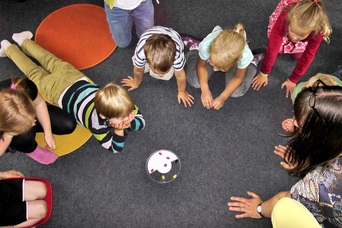Social Skills

The scientific teaching methods of Applied Behavior Analysis are utilized to effectively teach social skills within peer play dates. The central goal of social skills training is to pair other children with fun, reinforcing activities so that other children become more reinforcing and social interaction becomes more enjoyable, thus encouraging further appropriate social interaction and friendships. A scaffolding technique is used to teach social skills where the therapist will prompt the child when needed but will fade back and allow the child to interact independently when appropriate interaction is occurring. A fun, upbeat environment is maintained to encourage social engagement and foster friendships.
Areas of Focus In Social Skills Training
- Interactive play
- Initiating play
- Reciprocal play
- Tolerating changes to play
- Turn taking
- Attention/Attending
- Following directions/ rules of games
- Social communication
- Functional communication
- Initiating conversation
- Appropriate eye contact and body position when speaking and listening
- Assertiveness
- Identifying and understanding social cues
- Identifying and understanding non verbal communication
- Understanding and using appropriate personal boundaries
- Identifying and using appropriate vs. inappropriate behavior
- Rule following
- Coping skills and strategies
- Reduction of problem behaviors
Autism Social Skills Program
Learning to make and keep friends is crucial in every child’s life. Social skills lessons at Morning Star ABA Therapy provide direct instruction in functional social skills and opportunities to practice skills in a safe environment. Many children and adolescents on the Autism spectrum have a difficult time understanding and using social skills. They may have difficulty learning to respond to social cues. Social skills include everything from joint attention, eye contact, body posture/position, greetings and understanding the theory of mind and feelings of self and others. Social skills also include basic social rules and general behavioral expectations in different social environments. Social skills have a large impact on a person’s life and can affect the ability of a person on the autism spectrum to make and maintain friendships as well as participate in school, work and society.
ABA Positive Support Strategies used in Social Skills Training
- Pivotal Response Treatment (PRT)
- Natural Environment Teaching (NET)
- Scaffolding
- Proactive strategies (social stories, role play, priming)
- Verbal Behavior Training
- Extinction per function
- Planned ignoring
- Redirection
- Behavior contracts
- Token systems
- Positive behavior support

